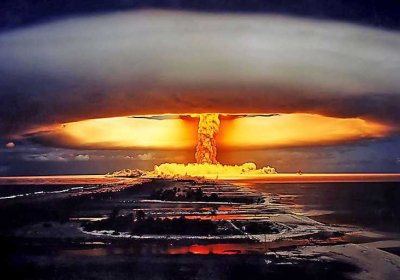More than 100 people attended public forums discussing the crisis in Venezuela and the need for solidarity with the Bolivarian Revolution against the threat of violent right-wing opposition in Geelong and Melbourne on July 28 and 29.
1149
Flanked by military commanders, Iraqi Prime Minister Haider al-Abadi was in the nation’s second-largest city, Mosul, on July 10 to announce the city’s liberation from ISIS.
An end to the three-year-long rule by the extremely violent and authoritarian terrorist group is obviously good news for the city's residents. But it seems unlikely the group’s defeat will mean an end to their suffering, which began long before ISIS captured the city in June 2014.
The Community and Public Sector Union (CPSU) has raised strong objections to moves by the Australian Public Service Commission (APSC) to impose severe restrictions on public sector workers' personal use of social media. "It is completely unreasonable for a worker to face disciplinary action over a private email or something as benign as 'liking' a social media post," CPSU national secretary Nadine Flood said on August 7.
NSW Premier Gladys Berejiklian’s surprise decision on July 27 to abandon plans for more local council mergers is a win for communities who strongly protested this undemocratic decision, said the Socialist Alliance candidates standing for the Inner West Council in the September 9 election.
Shashi Tharoor’s brilliant speech in 2015 to the Oxford Union on the motion “This house believes Britain owes reparations to her former colonies” went viral, receiving coverage across the world.
Tharoor, an MP for the Indian National Congress, former senior United Nations official, novelist and scholar, has now expanded the argument he made at Oxford into Inglorious Empire.
In June 1940, Winston Churchill described the German rout of the French, Belgian and British armies and the seaborne evacuation of 338,000 troops from Dunkirk in northern France as a “colossal military disaster”.
For a nation whose national identity is intimately bound up with victory and conquest, it is paradoxical that the retreat from Dunkirk has become such an important part of British mythology.
Quim Arrufat is a joint national spokesperson for the People’s Unity List (CUP), an organisation that he has likened to “urban Zapatistas” – in reference to the insurgent indigenous movement based in Chiapas, Mexico – that is committed to Catalan independence and socialism.
The case for re-nationalising the Commonwealth Bank of Australia (CBA) is becoming stronger every day. The latest in a string of scandals to hit "Australia's leading bank" is the revelation the CBA is facing allegations that its Intelligent Deposit Machines (IDMs) were used by money launderers and criminal gangs to process millions of dollars in cash.
Two very different exhibitions communicate critical evidence about the Aboriginal experience of the 1967 referendum, through which the Australian constitution was amended to remove the racist provisions of sections 51 and 127.
That victory certainly did not end racism in Australia, but opened up the possibility of a broader, unfinished struggle.
A recent expose by the ABC’s Four Corners has alleged significant illegal extraction of water from the Barwon-Darling river system, one of the major tributaries of the Murray River.
The United States submarine captain says: “We’ve all got to die one day, some sooner and some later. The trouble always has been that you’re never ready, because you don’t know when it’s coming.
“Well, now we do know and there’s nothing to be done about it.”
He says he will be dead by September. It will take about a week to die, though no one can be sure. Animals live the longest.
The war was over in a month
Walking into any souvenir shop in Australia, tourists see the walls lined with Aboriginal designs and artwork. What is less obvious is the fact that most of these items are mass produced in parts of Asia.
Banduk Marika, a Youngu artist, said: “We’re not making those. Indigenous people, even Australians, we’re not making those. Who is making this?”
Aboriginal communities say the answer is corporations.
- Previous page
- Page 3
- Next page











